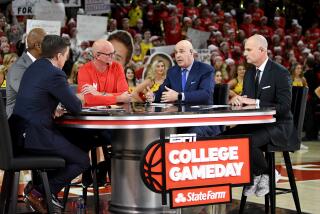Tallying ‘Idol’ disputes
- Share via
“American Idol” ended its eighth season last week. So what will fans do with all this newfound free time? Why, delve into another “Idol” voting controversy, of course.
Published reports have raised questions on whether AT&T;, a program sponsor, may have violated “Idol” voting rules at two pre-finale parties thrown for Kris Allen, the Arkansas crooner crowned winner last Wednesday. Partisans of Adam Lambert, the runner-up, have generated stormy online protests about alleged voting improprieties that could have thrown the outcome.
AT&T; confirmed that its employees handed out phones to party guests in Arkansas and then offered pointers on how to text votes. The reports said the workers also briefed guests on how to “power-text” multiple votes at once, which would have been a violation of “Idol’s” rules.
The fracas has embarrassed AT&T;, which has for years gotten repeated shout-outs from “Idol” host Ryan Seacrest in exchange for its paid sponsorship.
In a statement, the company said its workers were “caught up in the enthusiasm of rooting for their hometown contestant.” It added: “Going forward, we will make sure our employees understand our sponsorship celebrates the competition, not individual contestants.”
The producers, meanwhile, are defending the integrity of the voting process. “Fox and the producers of ‘American Idol’ are absolutely certain that the results of this competition are fair, accurate and verified,” the network and producers said in a joint statement Wednesday. “Kris Allen is, without a doubt, the American Idol. We have an independent third-party monitoring procedure in place to ensure the integrity of the voting process. In no way did any individuals unfairly influence the outcome of the competition.”
On that point, the producers seem to be on firm ground. According to a network spokeswoman, more than 100 million votes were received after the May 19 final performance between Allen and Lambert. Even if the AT&T; workers passed out 1,000 phones -- the company said it was “a small number” of devices, without offering specifics -- and coached each user to text 100 votes, that would add up to only 100,000 votes, or less than one-tenth of 1% of the votes cast.
Yet the murkiness surrounding the phone-in voting procedures all but guarantee conspiracy theories, especially given “Idol’s” status as America’s No. 1 show. Fox has never released more than bare-bones data about the tabulation process, which is managed by Los Angeles firm Telescope.
Fox says that it needs to keep the voting details secret to avoid helping any viewers who might attempt to game the system. The producers have also refused to release voting tallies for the contestants. Ostensibly, this is to sustain drama even during seasons when the results are lopsided throughout the season. But “Idol” has generally not provided such data even after the season has ended.
As a result, the AT&T; dust-up is only the latest voting controversy to afflict “Idol,” with partisans of rejected contestants always willing to point out how the system short-circuited their favorite. At the climax of the second season in 2003, Ruben Studdard beat Clay Aiken by a 130,000-vote margin, out of 24 million cast -- a margin of error of less than 1%. During Season 5, some viewers claimed that their intended votes for Chris Daughtry were mistakenly directed to phone lines serving other contestants. Daughtry placed fourth in the competition.
However, Fox appears unlikely to move in the direction of full disclosure. A spokeswoman contacted for this story said that beyond the statement, the network would have no comment.
--
More to Read
The biggest entertainment stories
Get our big stories about Hollywood, film, television, music, arts, culture and more right in your inbox as soon as they publish.
You may occasionally receive promotional content from the Los Angeles Times.











